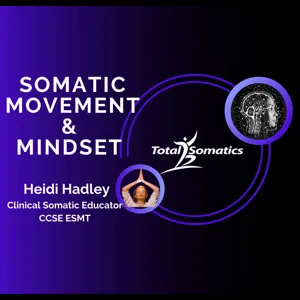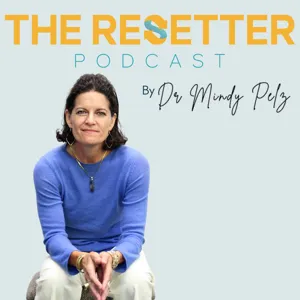Podcast Summary
Foods Impact Mental Health, Especially Anxiety: Eating healthy foods like salads and salmon supports gut health and mental well-being, while unhealthy foods can lead to toxic breakdown products and worsen anxiety symptoms.
The foods we eat can significantly impact our mental health, particularly in relation to anxiety. When we consume healthy foods like salads and salmon, the breakdown products, called short chain fatty acids, are beneficial to our gut. However, if we only consume unhealthy foods like corn chips and fast food, the breakdown products can be toxic and lead to conditions like leaky gut and inflammation, which can worsen mental health symptoms or even cause new ones. Doctor Uma Naidoo, a Harvard-trained psychiatrist, professional chef, and nutrition therapist, has conducted groundbreaking research on this topic and emphasizes the importance of a nutrient-dense diet for mental well-being. Anxiety is the most common mental health condition in the world, and the foods we eat can either exacerbate or alleviate its symptoms. By making conscious food choices, we can support our mental health and overall well-being.
The gut and brain connection in anxiety and weight gain: Anxiety and gut health are linked, with 90-95% of serotonin receptors and serotonin produced in the gut. Unhealthy food choices can worsen anxiety and lead to weight gain due to stress responses.
Anxiety and the gut microbiome are intricately connected, and this connection can significantly impact weight gain and loss. The gut and brain originate from the same cells in the human embryo and remain connected throughout our lives by the vagus nerve, which acts as a messaging system between these two organ systems. Ninety to ninety-five percent of serotonin receptors and serotonin are made in the gut, where food is being digested. Therefore, it's logical that what we eat can influence our mood and anxiety levels. When we turn to less healthy foods for comfort, it can lead to discomfort to the brain and weight gain due to the body's stress response. To combat this, it's essential to find ways to manage anxiety and focus on eating nutritious foods to support a healthy gut microbiome and overall well-being.
The Role of Food in Mental Health: Nutrients and Neurotransmitters: Eating tryptophan-rich foods consistently supports the production of serotonin, while unhealthy foods damage the gut and worsen mental health symptoms. Balance is key to maintaining good mental health through diet.
The foods we eat play a significant role in the production of essential nutrients and neurotransmitters, like tryptophan and serotonin, which impact our mental health. The breakdown products of healthy foods, such as salads, salmon, tofu, or tempeh, are beneficial for our gut and contribute to the formation of short-chain fatty acids. In contrast, unhealthy foods can damage the gut lining and lead to conditions like leaky gut and inflammation, which may worsen mental health symptoms. Tryptophan, found in foods like chickpeas and turkey, is crucial for the production of serotonin, and our bodies cannot produce it on their own. Eating tryptophan-rich foods consistently can help support this process. However, it's essential to remember that a balanced diet is a marathon, not a sprint, and moderation is key. While tryptophan supplements can be helpful for some individuals, it's essential to consult a healthcare professional before taking them, as our responses to tryptophan can vary significantly, and the supplement form may be more concentrated than food sources. Additionally, other neurotransmitters, like GABA, play a role in mental health, and understanding their role in our overall wellbeing is crucial.
The Role of Gut Bacteria in Producing Neurotransmitters: Focus on an 80/20 diet of whole foods for neurotransmitter support. Be cautious of synthetic supplements, and consider leptin regulation for appetite control.
Our gut bacteria play a crucial role in producing neurotransmitters like GABA, which is essential for regulating brain function. Imbalances in neurotransmitter levels can lead to mental health conditions like anxiety and depression. To support the production of neurotransmitters, aim for an 80/20 diet, focusing on healthy whole foods most of the time. While there are GABA drinks available, be cautious of synthetic versions and remember that the supplement industry is not FDA regulated. Leptin, another hormone discussed, helps regulate food intake and appetite. Consistently ignoring leptin signals can lead to leptin resistance, which may result in overeating and potential health risks. Keep an eye on your leptin response and consider seeking professional advice if you suspect an issue.
Exploring the Impact of Food on Physical and Mental Health: Exploring changes in eating patterns? Consider potential causes like processed foods, fast foods, artificial sweeteners, and their negative effects on health. Make healthier choices for optimal physical and mental wellbeing.
Our diet plays a significant role in both our physical and mental health. When we notice changes in our eating patterns, weight gain, or sluggishness, it's essential to explore potential causes, including our food choices. Processed, ultra-processed foods, fast foods, and artificial sweeteners are particularly harmful. These foods can trick the body into expecting sugar, leading to sugar crashes and increased food consumption. They can also disrupt the gut microbiome, negatively impacting overall health. As a psychiatrist, I strongly advise against consuming diet drinks due to their artificial sweeteners, which can contribute to weight gain, sugar crashes, and gut disruption. In summary, making healthier food choices is crucial for maintaining optimal physical and mental wellbeing.
Food additives can harm brain health: Non-nutritive sweeteners and excitotoxins in food and beverages can lead to weight gain, cravings, brain damage, altered brain chemistry, and addictive behaviors.
Non-nutritive sweeteners and artificial additives like excitotoxins, found in foods and beverages, can lead to weight gain, cravings, and even brain damage. Excitotoxins, which include substances like aspartame, overstimulate neurons in the brain, causing exhaustion and potential death. These additives can also alter brain chemistry and lead to addictive behaviors. It's important to be cautious about consuming these substances and to look for aspartame-free alternatives. The food industry often makes these products addictive to increase sales, which can be detrimental to our health. Stay tuned as we dive deeper into the specific macro and micronutrients that are crucial for managing anxiety. Remember, taking care of ourselves and our loved ones starts with making informed choices about the food we consume.
Begin your weight loss journey with PlushCare or shop for Mother's Day at Whole Foods: Make small changes for weight loss like cleaning up habits, eating nutrient-dense foods, staying hydrated, and trying natural substances like saffron for mood and anxiety.
PlushCare offers a convenient and effective way to begin your weight loss journey with online access to board certified physicians who can prescribe FDA approved medications. Meanwhile, Whole Foods Market is an ideal destination for Mother's Day shopping with unbeatable savings on premium gifts, flowers, and desserts. Dr. Uma Naidoo, a Harvard psychiatrist, shared her personal experience with weight loss and found that making small changes, such as cleaning up unhealthy habits and incorporating nutrient-dense foods, hydration, and calming teas, made a significant difference. As a clinician, she also advocates for natural substances like saffron, which has been shown to be effective in treating anxiety and mood, and can be an alternative to antidepressants for some individuals.
Simple lifestyle changes for mental health: Staying hydrated, trying supplements, and focusing on nutrition can significantly improve mood, reduce anxiety, and complement mental health treatment.
While medications and psychotropic drugs can be lifesaving tools for managing mental health, they are not the only solutions. Simple lifestyle changes, such as trying different supplements, foods, and increasing hydration, can also significantly improve mood, reduce anxiety, and even prevent certain mental health symptoms. For instance, staying hydrated is crucial for brain health, and dehydration can lead to depression and anxiety. Electrolytes in water can enhance hydration and provide essential micronutrients, including magnesium and iron, which are vital for mental wellbeing. By focusing on these simple yet effective practices, individuals can complement their mental health treatment and improve their overall quality of life.
Checking Vitamin D and B12 levels, addressing iron deficiency, and avoiding inflammatory oils are essential for maintaining a balanced diet for overall health.: Ensure proper Vitamin D and B12 intake, address iron deficiency, and avoid inflammatory oils for a balanced diet promoting physical and mental well-being
Maintaining a balanced diet is crucial for both physical and mental health. Vitamin D deficiency is common, especially in the northeastern part of America, so checking your vitamin D levels is important. B vitamins, particularly B12, are vital for mental health, especially for those following a plant-based diet. Iron deficiency, common among women during menstruation, can lead to anxiety and should be addressed, especially for those avoiding red meat. Additionally, avoiding pro-inflammatory seed oils used in fast food and opting for healthier alternatives like olive oil, coconut oil, ghee, or avocado oil can help reduce inflammation in the body and brain.
Moderation is key: Discover the health benefits of various foods: Olive oil, dark chocolate, broccoli, blueberries, red wine, coffee, and hemp milk offer health benefits when consumed in moderation, each with unique nutrient profiles
Certain foods and beverages, when consumed in moderation, can offer numerous health benefits. Olive oil, for instance, is heat stable and rich in polyphenols, making it a heart-healthy choice. Dark chocolate, broccoli, blueberries, and even red wine, in moderation, have been linked to various health advantages due to their unique nutrient profiles. Coffee, rich in plant polyphenols, can be a part of a balanced diet, but it's essential to avoid excessive caffeine intake and enjoy it in its simplest form. Hemp milk, made from hemp seeds, is a creamy, plant-based alternative to dairy milk, and it's a source of various nutrients, including short-chain omegas. However, it's important to note that while these foods have potential health benefits, they should not be considered a substitute for a balanced and varied diet.
Make conscious food choices for better wellbeing: Incorporate nutrient-dense options like meats, plant-based proteins, veggies, fermented foods, and dark chocolate for improved mental and physical health.
We have the power to improve our mental and physical wellbeing through the foods we choose to consume. Uma Dhupelia-Mesthrie suggests incorporating nutrient-dense options, such as meats like turkey or salmon, plant-based proteins like tofu, and a variety of vegetables, especially cruciferous and leafy greens. She also recommends fermented foods, like miso, and dark chocolate for dessert. Uma emphasizes the importance of feeling good and encourages hosting an anti-anxiety dinner party for loved ones. This conversation highlights the significance of making conscious food choices and the positive impact it can have on our overall wellbeing.





